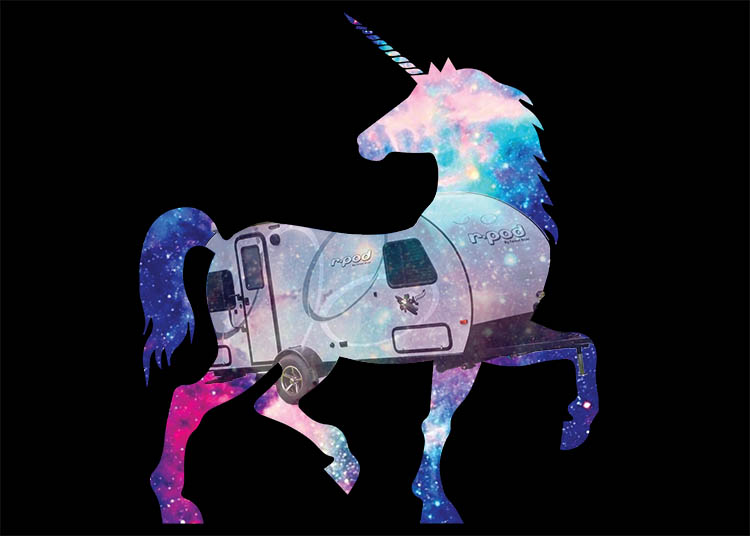Myth #1: If a trailer is called “lightweight”, it is lighter than others, will get better gas mileage, and be a better value than the heavier ones.
- The term lightweight has become a selling word. Everything from small teardrop trailers to large 5th wheels have incorporated the name lightweight. (That’s why we include the term itself among our list of myths.) While their product may be slightly lighter than some similar sized products, some are about the same! Focus on the trailer, the construction, the layout, the décor, and features of the trailer that you are sure will work in your weight limitations.
- The design of the trailer has as much to do with the gas mileage as the weight does. Generally, gas mileage won’t vary nearly as much as people think it will based on your buying decision within a weight range. Yes, you will lose some gas mileage, but the tow vehicle and the general weight of the trailer behind you will determine how much gas mileage you lose, so choose the trailer that’s right for you!
- If the concern is towing, you may have some underlying thought that a “lightweight” trailer would be easier. The truth is that getting the weight range well within the towing capacity of the vehicle is what makes towing easier. Even a smaller trailer being towing at the vehicles absolute highest capacity can be uncomfortable. A good rule of thumb is to assume you will load about 500 lbs of stuff in the trailer, (more if you have heavy backpacking gear, motorcycles, etc). There’s really no need to travel with full water tanks, so a few gallons for flushing or washing hands can easily be included in your 500 lb added number. Then see where you are in the weight rating, and try not to fib to yourself when you are calculating!
Myth #2: If I don’t buy a trailer with enough beds, my grandkids won’t camp with me.
- What? First of all, if grandkids want to camp with you, not having a bed would not deter them. Having a cool bunk bed or their own space would be fun, but not imperative. Kids, even older ones, will make do with a dinette or floor space if they want to go where you are going in a trailer. Having their own tent can be awesome, too!
- I hate to say it, but they probably won’t travel with you as much as you think they will. If you are buying a specific model in order to accommodate other friends or family traveling with you, you might regret it. Look for what works for you and your permanent traveling companions!
Myth #3: Single axle trailers aren’t safe.
- Double axle trailers are more steady when towing down the road, it’s true, but single axle trailers are not that scary. They are obviously light weight trailers, and you can’t limp to the gas station if you have a flat, but in general, they are safe and will tow just fine!
- If a flat tire is the concern, then the focus needs to be on taking care of your tires instead of buying a bigger, heavier trailer than you want or need. Sad to say, most trailer flat tires on the road could be avoided with good maintenance. Tires get old, dry rot, or have road damage. Keep an eye on them, replace them when needed, and avoid any unnecessary tire problems!
Myth #4: Buying a used camper that has only been camped in twice in 3 years is awesome!
- Mechanical equipment that is never used can deteriorate, and you won’t know it unit you use if for a little while
- Generators, especially, need to be run every month or two for maintenance, so low use or no use over multiple years isn’t better.
- Maintenance on a trailer, whether it’s sitting or traveling is the most important info to have when considering a used one. Look carefully at the seals, the details on the interior for humidity and water leaks, and test every appliance!
- Remember, if a trailer has not been bumped down the road in a while, you can’t guarantee what it will do when it makes it’s next journey
Myth #5: Backing up is hard!
- Everything is hard when you first try! Do you remember how hard it was to learn to go forward? Give yourself a break, and some time to practice.
- A shorter trailer may make it easier to turn corners, but not to back up. The shorter trailer turns quickly, so give yourself time to get the hang of it.
Myth #6: My seals are fine! I keep it inside the shed!
- Heat and age as well as sunlight cause seals to shrink and deteriorate.
Myth #7: RVing is for the retired folks!
- That’s true! But it’s for everyone else too!
- Trailers come in so many different sizes, shapes and uses.
Some are more like gear for a backpacker, others are like luxury homes on wheels. Everything in between.
Myth #8: A bigger rv (for the same price or cheaper) is always better!
- Rvs are generally priced on quality and volume build,
- Truck campers, some quality trailers are not the cheapest real estate per wq. Ft.
- Look for the quality you want, the budget you want, and the space that works for you. All of those are important, and you may need to give a little in one or two areas to get the perfect trailer!

